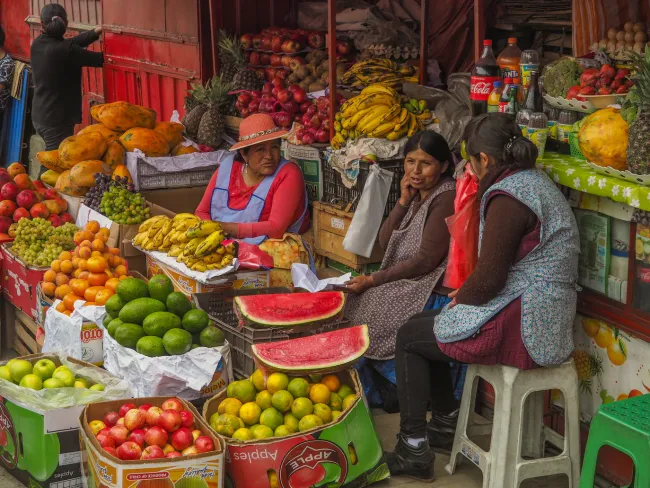This paper studies how a top-down (i.e. state-led) food sovereignty policy in Bolivia was negatively impacted by the “corporate food regime”. Food sovereignty was included as a central element of Bolivia’s new constitution in 2009, and regulations were introduced to prioritise food from small-scale farmers in school feeding programmes.

Based on a series of interviews, the paper concludes that small-scale producers tend to conceptualise food, skills, practices, organisations and so on in ways that differ significantly from “corporate food regime logics” - which are more in line with the ways of thinking used by NGOs and local municipality staff and politicians. These differences created tensions between the different actors involved in the implementation of the food sovereignty policy.
As one example, producers reported that in order to access the market for school food, they had to become familiar with technical or specialised language. Some producers felt unable to ask for clarification or speak freely in meetings, particularly those for whom Spanish is a second language or who have a low level of education, because of the embarrassment of not being familiar with this terminology.
In another example, some NGO representatives and local municipality staff tended to speak about food production in relation to markets, for example arguing that small-scale farmers should be producing food only for the commercial market or that uncompetitive producers should be relocated or should change their production patterns. Farmers, in contrast, spoke more about food as necessary for their subsistence, and highlighted the importance of reducing food waste to avoid angering Pachamama (the paper explains that “Pachamama means “Mother Earth” in the language of the Quechua and Aymara people of the Andes”) and affecting the next year’s crops.
Abstract
The food sovereignty concept has gained prominence in public policy discourses in the global South during the last decades. However, food sovereignty has contested definitions and is interpreted differently by conflicting societal interests. Consequentially, the translation of food sovereignty concepts into concrete policies and practices is often characterized by conflicts and controversies rooted in different institutional logics guiding the involved actors. In this article, we analyse how the logics of the corporatized agro-food system affected the local implementation of top-down state-induced public food sovereignty-based policies in Bolivia. We conducted a multiple-case study of public food procurement markets for school feeding programs involving three rural municipalities and small-scale producers in the Altiplano region. The data consists of 53 interviews conducted during 2011–2015. We found that corporate food regime logics influence the local policy implementation process in three ways. First, by framing the chosen policy design as neoliberal individualistic and transaction-based market-orientated. Second, by envisioning for the Aymara subsistence peasants a socially and culturally undesirable identity and class transformation; and thirdly, indirectly through the dependency of the school feed program on adjacent field-level institutions shaped by the corporate food regime logics. We conclude that the corporate food regime logics shaped the notion of what was considered legitimate practices and processes required for smallholders to access the public food procurement market, whereas their own conceptions aligned with food sovereignty principles were disregarded.
Reference
Mercado, G. and Hjortsø, C.N., 2023. Explaining the development policy implementation gap: A case of a failed food sovereignty policy in Bolivia. World Development, 166, p.106216.
Read the full paper here. See also the TABLE explainer What is food sovereignty?




Comments (0)